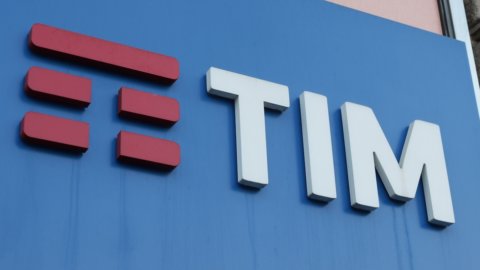Other than inflation. To frighten the Bull, reassured by the less threatening Fed minutes than feared, is the Beijing Dragon, which launches flares that leave their mark almost everywhere. On the American markets, where the collapse of the Didi freshman number (-4,6% after the -20% following the stop of the App imposed by the Chinese authorities) caused losses in the billions accompanied by criticisms of Wall Street, guilty of an "irresponsible" choice. But also on Italian football: Suning, owner of Inter, was saved by public intervention but with the money from Alibaba, which was forced to participate in a capital increase. President Xi's line is clear: money for the economy to save small and medium-sized enterprises, beating the masters of the web and the rich who have drawn heavily on easy credit, such as Evergrande, a real estate giant burdened with debts of 150 billion dollars, linked to Suning by suspicious financial transactions. In short, something more than a summer storm, but also the guarantee that the risk of speculative "bubbles" was averted in time.
The Hong Kong Stock Exchange drops to its lowest since the beginning of the year and closes down by 2,9%: the Hang Seng index, which reached its eighth consecutive session of declines, pays for its large presence of high tech companies and shelters from any further offensives by Beijing on the sector.
The CSI 300 index of the Shanghai and Shenzen stock exchanges also lost 0,5%. Tonight, the State Council of China, a subject similar to the government, announced that it intends to intervene to "improve support for the real economy" with monetary policy measures that will also include cutting the banks' compulsory reserves. Privileged subjects of the measure will be small and medium enterprises. Tonight's announcement signals the arrival of falling macroeconomic data in the coming weeks: the Bloomberg consensus expects growth of 8% for the second quarter, from +18% in the first.
Tokyo's Nikkei is down 0,7%. There is still no official government statement, but the directorate that manages the pandemic emergency has already decided: a state of emergency in the prefecture of the Japanese capital from July 12 to August 22, a period that covers the Olympic Games. The local press writes that the sporting events will be closed to the public.
Korea is also down (-1%) due to the increase in infections. The Asia Pacific index posts the steepest losses since May.
Fear and uncertainty infect the European stock exchanges where Milan came to lose almost 3%, driven by sales on banks but also on cars and raw materials, after the fall in oil prices. To make matters worse, new strategic guidelines have arrived from the ECB which, in line with what has already been decided by the Fed, has revised the inflation target to a "symmetrical" 2%. The inflation target set at 2%, write the analysts of Mps Capital Services, "should allow the ECB to maintain an accommodating policy for even longer, considering that, according to the Institute's latest estimates, inflation in 2023 should settle at 1,4%, far from the target".
In essence, the ECB Governing Council believes that price stability "is best ensured by aiming for an inflation target of 2% over the medium term - explains the statement released at 13pm on Thursday - this target is symmetrical, which means that negative and positive deviations of inflation from the goal are equally undesirable. When the economy is operating near the lower bound of nominal interest rates, particularly forceful or persistent monetary policy action is needed to prevent negative deviations from the inflation target from becoming entrenched. This may also imply a transitional period in which inflation is moderately above target.' Despite the reassurance, the market probably sees these words as a warning of a change in monetary policy and in any case pushes in the direction of a rate hike.
Wall Street futures fell slightly this morning following the publication of the minutes of the last Fed meeting. Last night the indices closed as follows: Nasdaq -0,01%, S&P 500 +0,34%, Dow +0,30 ,XNUMX%.
The divorce between Bill and Melinda Gates will also concern philanthropy. A plan has been announced to separate the charitable activities of the two, who are embroiled in a bloody separation.
The minutes of the Fed meeting confirmed that a significant number of members of the Federal Open Market Committee, surprised by the strength of the economic recovery, suggest thinking about reducing monthly bond purchases, now at 120 billion dollars. It is probable that the meeting of July 27-28 will end with a note in which the general terms of the remodulation are anticipated: the details should be revealed in August in Jackson Hole.
The dollar rose, the 1,31-year Treasury Note stabilized on the lows of the last five months at 1.800%. The rise of gold has stopped, as it cannot exceed XNUMX dollars an ounce.
Another sign of a slowdown in growth comes from oil. WTI is down 0,2% to $72 a barrel, on levels two weeks ago. The Wall Street Journal he says that the United Arab Emirates are putting their foot down because they want to take advantage of high prices to produce as much as possible, probably in view of a retreat in quotations. The long-term strategy is to reduce dependence on oil, but to finance the transformation of the economy it is necessary to monetize the reserves of crude oil present in the subsoil.
GERMANY HOLDS BACK, THE BEAUTIFUL COUNTRY ACCELERATES TO +5%
While awaiting the minutes of the FOMC meeting (the operational arm of the Fed), the decline in yields continued in Europe: the Delta variant, which reached 40% of new infections, fuels the risk of a fourth wave. Meanwhile, the euro/dollar exchange rate falls below the psychological threshold of 1,18 and reaches 1,1793 (-0,23%) reflecting the slowdown of the German locomotive: industrial production beyond the Rhine showed a cyclical downturn of 0,3, 0,5% in May against expectations of a rise of XNUMX%.
But on the contrary, the numbers of the Italian economy improve in return: the Bel Paese's GDP is expected to grow by 5% in 2021, from +4,2% estimated this spring by the European Commission, which also revised its 2022 estimate downwards, to +4,2% from +4,4%. The document released yesterday morning speaks of an "improvement of the health situation", of "solid and sustained expansion" and finally of "public and private investments, supported by the decrease in business uncertainty about the prospects of demand and by the implementation of the Pnrr”. Inflation is estimated to grow by 1,4% in 2021 and 1,2% in 2022. The EU Commissioner for the Economy, Paolo Gentiloni, says he expects Italy to have "pre-crisis growth levels in course of 2022, while several other countries will reach them earlier, in the course of 2021”. Gentiloni adds that, with regard to the discussion on the revision of the stability and growth pact, "we need to encourage everyone to evaluate the need to continue with expansionary policies and support for our economies".
MILAN +0,2%. ESSILORLUXOTTICA (+2%) FIRST TITLE IN PARIS
Piazza Affari is satisfied with a modest +0,23%, at 25.184, down in the last few stages. Identical script for the other markets, conditioned by the slowdown on Wall Street: Paris rises by 0,31%, Madrid drops by 0,07%. Frankfurt (+1,15%) and London (+0,71%) closed with a more substantial increase.
Essilor Luxottica (+2%) leads the Paris price list after the promotion of Berenberg from 150 to 175 euros.
The race for luxury continues: a new record for Hermès, an increase of around 1% for L'Oréal and Lvmh. The luxury rally takes the French stock exchange to the top of the world market rankings in 2021.
In London, Shell takes off (+2,4%) after announcing that it will increase shareholder remuneration through buybacks or dividends.
PURCHASES ON THE BUND, THE SPREAD GOES BACK TO 107
The Italian secondary is in pale red: the 10-year BTP rate falls slightly to +0,74% (after a dip to 0,72%), but the spread with the 107-year Bund rises to 2,1 basis points (+0,34% ) with the major purchases on the German bond (rate -10%) which manages to benefit from the drop in Treasury yields, which saw the 1,3-year rate return today below XNUMX% for the first time after more than four months.
Traders talk of massive short-outs piling up on the Treasury in a futile expectation that the recovery would send yields, which move inversely to prices, back higher.
TARGET 2 DEBT AT 521,5 BILLION, TOP SINCE SEPTEMBER
In Italy, Target2 debt rose to its highest level since last September in June, according to the consolidated financial statement document prepared by the Bank of Italy. Liabilities to the euro system amounted to 521,506 billion euros from 493,464 billion in May. Also last month, the total exposure of Italian banks to ECB loans stood at 463,88 billion, compared to 447,96 billion in the previous month.
BUZZI AND RECORDATI, BULL TITLES IN MILAN
Leading the race on the Milan stock exchange was Buzzi Unicem (+3,15%). There Frankfurter Algemeine reports that the European Commission is working on a system for remodulating the emission of free CO2 production rights: in the draft, confidential for now, a very gradual zeroing of these certificates is envisaged, with a 50% cut by 2030.
Recordati's race continues for the second day (+3,3%) which benefits from possible regulatory measures relating to funds for rare diseases. Diasorin +1,5%.
The drop in yields gives wings to utilities: Terna +1,8%. Enel +1,5%.
HERA, AXIS WITH CREMONINI IN THE BIOMETHANE
Hera (+2,19%) deserves a separate note: the company has announced a partnership with Inalca (Cremonini group) for the production of biomethane.
Oil companies stand out among the worst stocks: Saipem loses 2,8%. The company also lost the appeal against Consob presented to the Lazio Regional Administrative Court. Tenaris -1,49%, Eni -0,82%.
COLLECTION OF MANAGED RUNS, AZIMUTH +0,63%
Asset management thwarted: Azimut gains 0,63% after recording positive net inflows into assets under management of over one billion in June 2021, thus reaching over 12 billion in total net inflows since the beginning of the year. On the other hand, the Banca Mediolanum share was negative (-0,95%) despite the institution exceeding the target of 100 billion in assets under management. Among the securities of credit institutions, the worst is once again Unicredit (-1,56%).
TODAY IS STELLANTIS ELECTRIC DAY, THE STATE CLOUD IS BORN
Down Leonardo (-1,09%). There is a public/private proposal for the public administration cloud. Leonardo is involved together with Cdp and Tim, as Alessandro Profumo confirmed yesterday: "We are intensely involved, we are talking on several fronts both with the national telecommunications operator and with Cdp, we are evaluating how to cooperate and we are absolutely sure that Leonardo can give a significant added value in the service component”.
The Fiat galaxy is bad with Cnh (-0,8%) and Stellantis (-0,82%), the latter on the eve of today's presentation of the electrification strategy. Finally, Culti (+11,19%) and Clearbnb (+11,02%) stand out on the Aim.
(Updated 14:40pm Thursday 8 July 2021)





